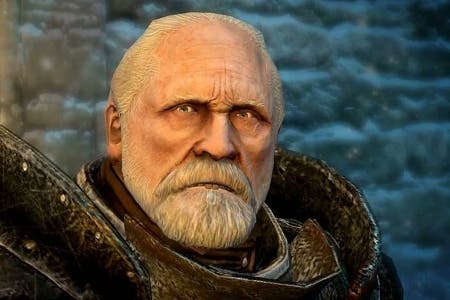Game of Thrones Review
Questionable tactics.
This is an import review of the North American edition of Game of Thrones, published by Atlus USA and available now. The European version, published by Focus, will be released next week on 8th June. To our knowledge this review is accurate with respect to both versions.
I have no idea how cross-media ventures work. I imagine corporate heads from various interests getting together to pow-wow about how to make consumers spend more on various series they've already invested in. Usually, somewhere along the way, a game pops out. Sometimes it even goes well. Most of the time, it doesn't.
When it doesn't, it often comes down to the awkward matter of canonising slices of fiction that previously didn't exist - which can be especially problematic when these untold stories throw a wrench in fixed timelines. This is how we now live in a world where Darth Vader had a secret apprentice he never mentioned before. No matter - Star Wars is pretty mercurial these days anyway.
With its wide ensemble cast and the steadfast mortality rate of Shakespearean tragedy, Game of Thrones has the potential to avoid most of the pitfalls associated with tie-ins, if only because Westeros is a vast enough realm to incorporate tales far from the HBO series' televised gaze. This role-playing game does take place concurrently to the events of the first season of the show (or first book, if you prefer); it uses music from and inspired by Ramin Djawadi's score and has the voices and likenesses of the actors. Yet its tale isn't about House Stark, and the villainous Lannister clan has only a passing influence. In fact, one of the more interesting things about it is how the touches from HBO's own adaptation feel almost like after-effects.
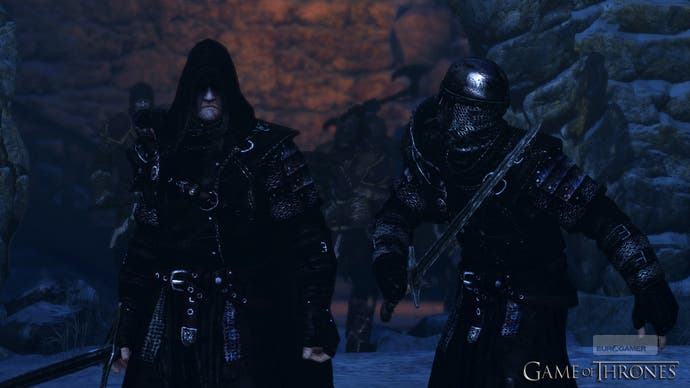
I guess this is because developer Cyanide was working with author George R.R. Martin on the game before the show was even close to a reality. As much as it pains me to say it, this was probably to its detriment. This Game of Thrones is dishearteningly off the mark - but stick with it and it offers some compensations of its own.
It starts off at a ponderous pace (an appropriate match to the glacial setting of the Wall). For an Unreal Engine game, its visuals are a crapshoot that, at their worst, barely qualify as current-generation. The voice acting will make you cringe while the writing can be tepid and embarrassingly expository. (It was a terrible, terrible idea to open the game with a long-winded speech from Jeor Mormont about the responsibilities, duty and pride of the Night's Watch that every fan will already be intimately familiar with.)
Once you start running around Castle Black as the brooding, grizzled ranger Mors Westford, you realise combat plays like a less violent Dragon Age: Origins - a poor excuse for a battle system if you want to capitalise on the sheer brutality of melee as depicted by the show. To twist the blade further, the game is riddled with glitches and bugs.
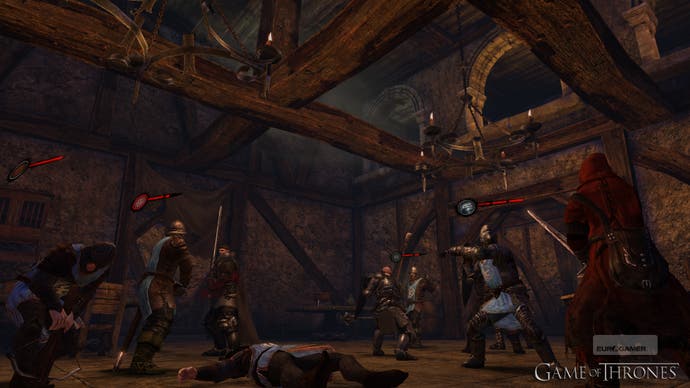
Game of Thrones doesn't exactly put its best foot forward then, and any excitement you feel at entering the world of Westeros will wane fast over the first few hours. Then, several eye-rolling mentions of the titular game later, the political machinations begin in earnest. To my great surprise, this narrative development significantly pulled me in.
While the rivalry between the Starks and the Lannisters slowly builds in the capital city of King's Landing, Cyanide's game jumps between Mors and a nobleman and Red priest, Alester Sarwyck of Riverspring: the son of the house's late lord, Alester has come out of a self-imposed 15-year exile to pay his last respects to his father. Alester soon learns his bastard-born half-brother, Valaar, is to inherit Riverspring despite being thrown out when the elder Sarwyck was still in power. A lawful and pious man, Alester decides to reclaim his place as heir to Riverspring after seeing the desperate state of his town. To do this he must challenge Valaar, now entrusted with dirty dealings in the service of Queen, Cersei Lannister. It's a power struggle waiting to happen.
The link between Mors' and Alester's disparate storylines develops slowly, and without getting too involved in the Byzantine plot, it glances a few narrative threads from the first season before coming into its own as an equally intricate tale of power. There are long stretches where it doesn't beat you over the head with its tie-in status - aside from a few brief appearances by a handful characters that have appeared in HBO's series, Cyanide and Martin were able to create a convincing bit of canon that is its own sovereign conflict while paying logical attention to the influence of events in the captial. It feels like a natural extension of the world rather than forced fan-service or a franchise extension created in vacuum.
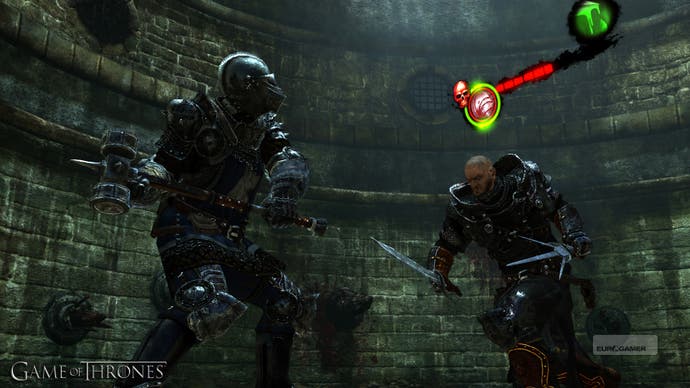
Like the storytelling, gameplay is a slow burn. While it's almost criminal that the game wasn't designed from the start as an action role-player with graphic combat more akin to The Witcher 2 or Dark Souls, the turn-based battles carry a certain dated charm that grows on you. Selecting commands from your ability wheel slows time, adding a bit of strategic flavour when you choose how you want to strike. Unlocking new skill tree abilities helps, and given that you can control many of the partners that come and go from your party as the story dictates, it can be quite fun figuring out how to best use your party's skills later in the game, when larger, more chaotic melees become more common.
Outside of combat, BioWare-style choices affect how the story develops with some impact. An early example occurs when Alester, faced with famine and a crumbling economy in Riverspring, can either quell a civilian mob through violence or charity; choosing the latter earns popular support when you later face an invading army. This works with people's perceptions of you, too. But many choices are ambiguous, and there were more than a few cases when I thought I was picking the best answer for the situation only to have it blow up in my face.
Then there's Mors' dog, unimaginatively named the Hound. When you're not actively in combat or talking with someone at length, you're often are left navigating the Hound (Mors is a Skinchanger, who can control beasts with his mind) through stealth sections placed at random intervals throughout the game. I like these segments, misplaced as they may feel. The AI is dumb enough that it's never really a problem getting through an area, and sneakily ripping soldier's throats out as a dog is as entertaining as it is useful in avoiding actual combat with Mors. The Hound can also detect scents needed to continue your quest - hilariously chosen from a smell wheel, similar to how you pick abilities in battle.
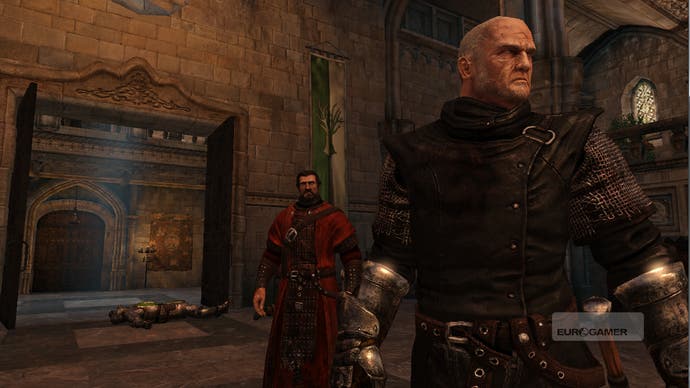
With all its inconsistencies, Game of Thrones reminds me of a less polished Alpha Protocol - another weird, buggy RPG that overcomes its flaws to some degree with fascinating narrative implementation and a world that actually seems to respond to your actions. Some TV fans may gripe that Game of Thrones skimps on skin and slaughter; true, violence is mostly no worse than blood splatters and impalements, while sex is mostly contained to implications of rape, a word bandied around easily (not to mention the first notion of necrophilia I can recall encountering in a game).
The maturity is instead evident in Game of Thrones' political leanings, which are wrapped up in a cautionary tale that questions the roles of duty and loyalty in matters of the crown. At about 20-25 hours, it's not long enough to really overstay its welcome, and in spite of my initially poor impressions of it, Game of Thrones ended up winning me over. It's a refreshing to see a small, scrappy developer take on a giant license like this, even if it's only by chance.
It won't replace the TV show, but for all its flaws I'm eager to see how Cyanide, if it keeps the rights, can improve on this. Compared with most tie-ins, it's likely things will only get better.
